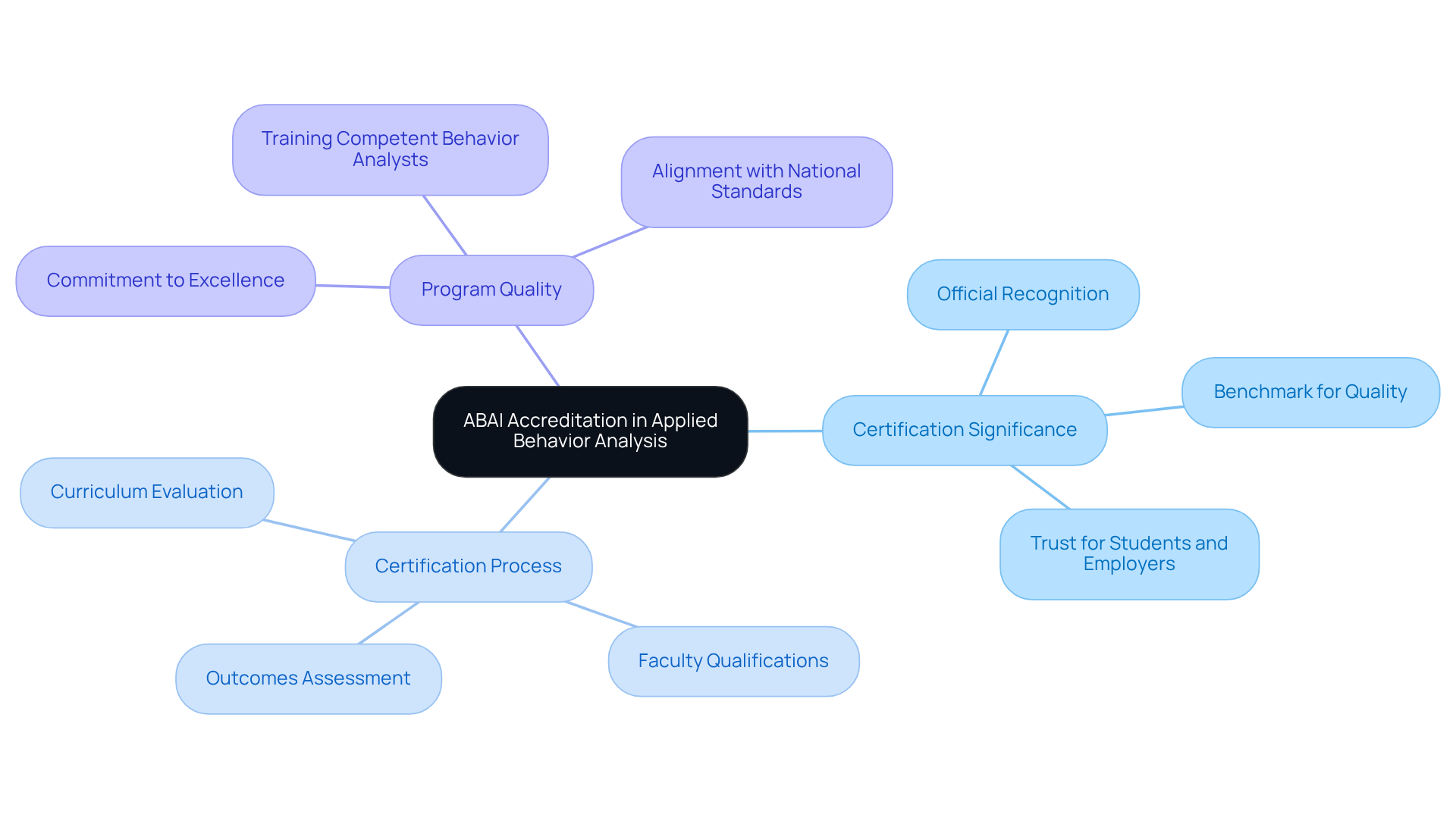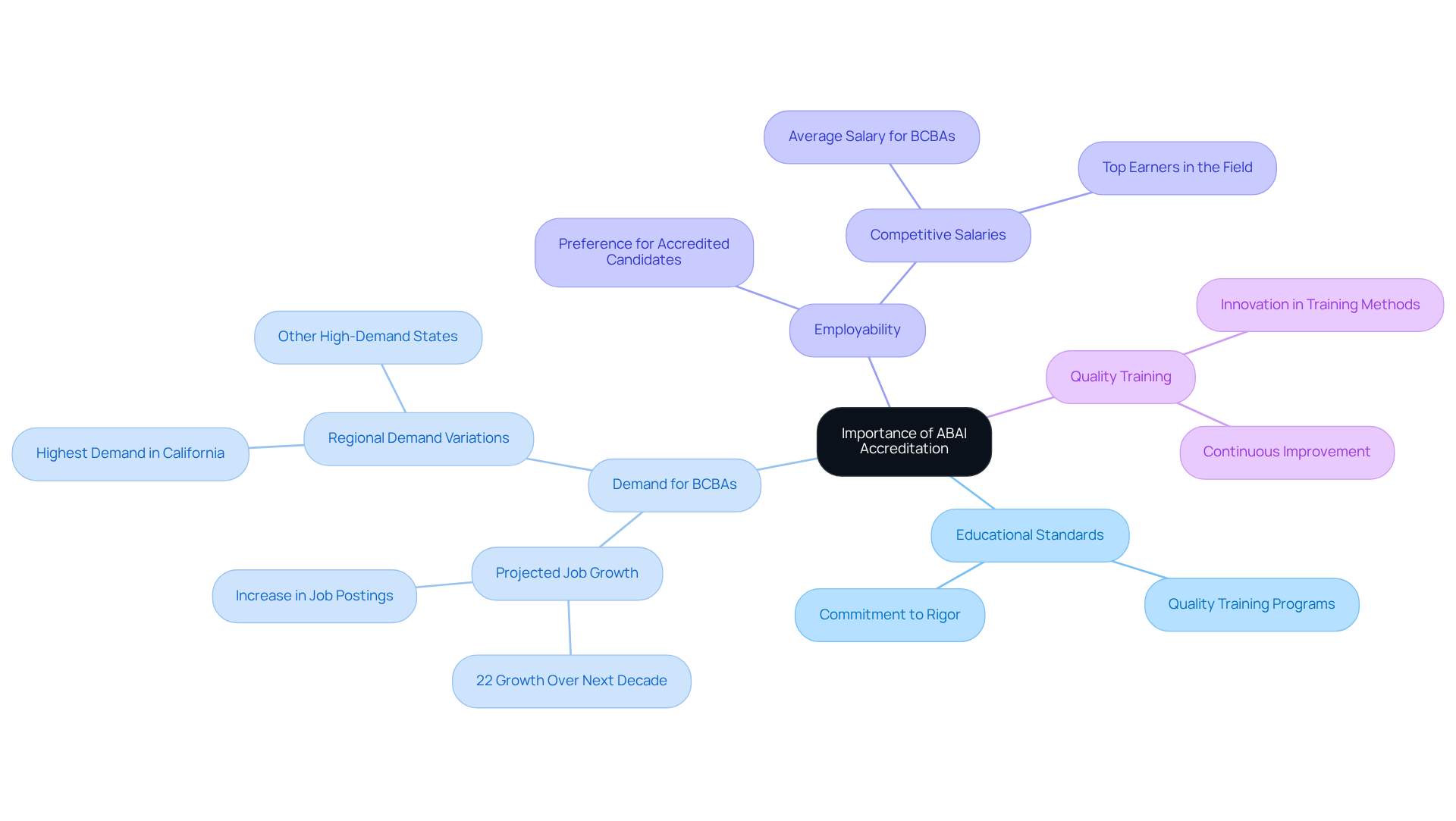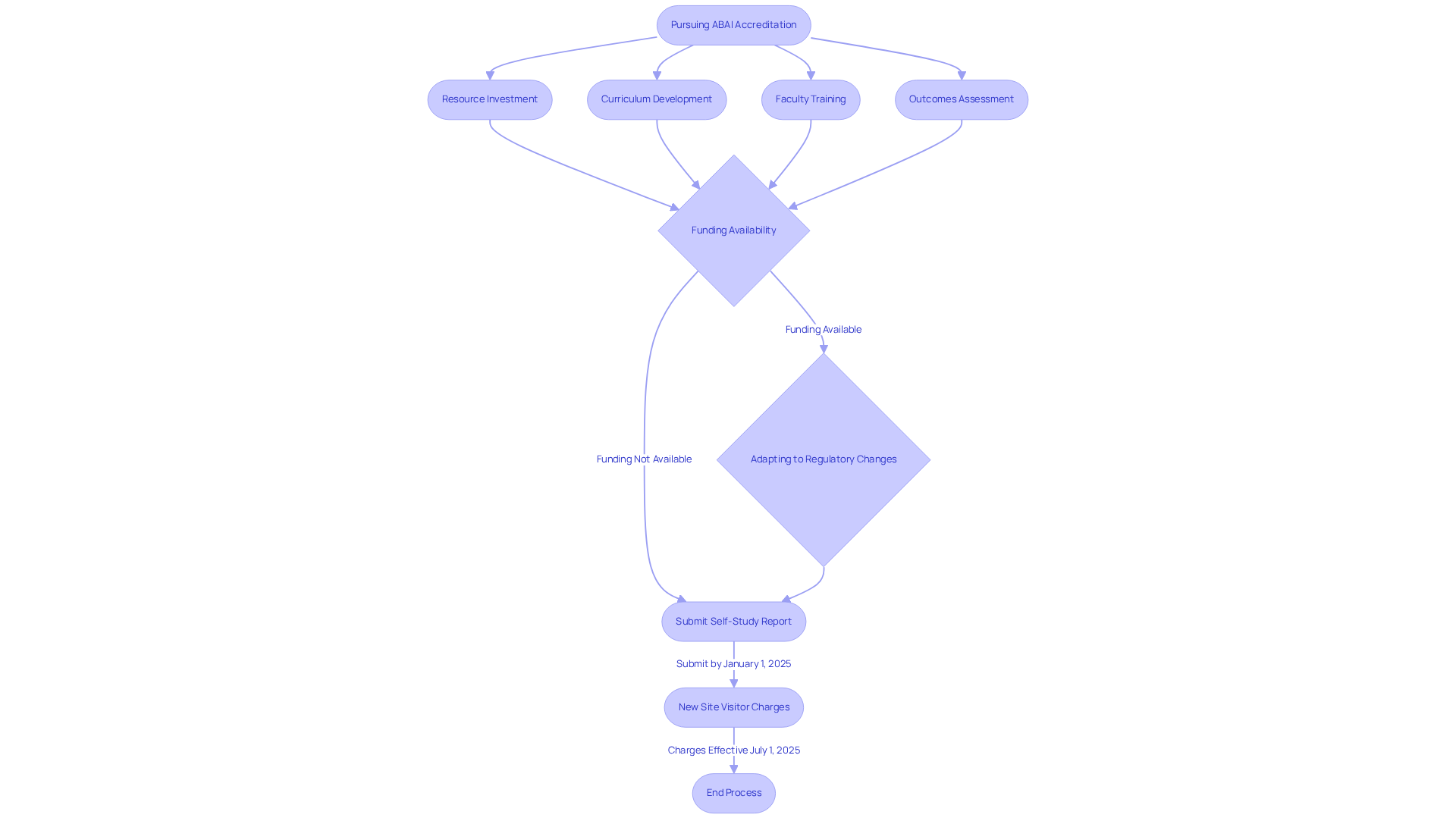August 29, 2025

ABAI accredited programs significantly enhance career opportunities for behavior analysts, ensuring high educational standards that are increasingly favored by employers.
Did you know that many employers prefer candidates from recognized institutions? Graduates from these accredited programs not only enjoy higher starting salaries but also have better job prospects. This preference stems from the rigorous training and commitment to quality that these programs provide.
As you consider your hiring strategies, reflect on how the credibility of accredited programs can impact your recruitment decisions.
ABAI accreditation stands as a hallmark of quality in the field of Applied Behavior Analysis, representing programs that meet rigorous educational standards. As the demand for Board Certified Behavior Analysts (BCBAs) continues to rise—projected to grow significantly in the coming years—the significance of this accreditation becomes increasingly clear. It offers graduates a competitive edge in a thriving job market.
Yet, what challenges do institutions face in achieving and maintaining this prestigious recognition? How does it truly impact the career trajectories of aspiring behavior analysts? Exploring these questions reveals the critical role ABAI accreditation plays in shaping both educational excellence and professional opportunities in this dynamic field.
Consider how this accreditation not only enhances program credibility but also influences hiring decisions within the industry. Institutions striving for ABAI accreditation must navigate a complex landscape of standards and expectations, which can be daunting. However, the rewards are substantial, both for educational programs and their graduates.
This certification signifies the official recognition granted by the Association for Behavior Analysis International to abai accredited programs in that meet rigorous standards of quality and effectiveness. The certification process involves a comprehensive evaluation of the curriculum, faculty qualifications, and outcomes assessment.
Abai accredited programs demonstrate a commitment to excellence in training behavior analysts, equipping graduates to effectively address the demands of the profession. Abai accredited programs serve as a benchmark for quality, ensuring that both students and employers can trust the course adheres to established best practices in behavior analysis education.

ABAI recognition is essential for upholding high educational standards in Applied Behavior Analysis. Did you know that the demand for qualified Board Certified Behavior Analysts (BCBAs) is projected to surge by 22% over the next decade? This statistic underscores the , which ensures that training programs produce adept professionals equipped with the necessary skills and knowledge. Such certification not only promotes continuous improvement within initiatives but also sparks creativity to meet the evolving demands of the sector.
Moreover, employers are increasingly favoring candidates from accredited institutions, as this designation reflects a commitment to quality and rigor. This significantly enhances the employability of graduates in a competitive job market. In this context, ABAI accreditation emerges as a vital differentiator for both institutions and job seekers, highlighting the critical role of quality training in the field.
Are you facing challenges in hiring qualified BCBAs? Consider how Hire ABA can streamline your recruitment process and connect you with top-tier talent. The time to act is now—prioritize quality and ensure your organization stands out in this growing field.

The demand for Board Certified Behavior Analysts (BCBAs) has surged, with an impressive annual growth rate of 14% since 2010. Completing abai accredited programs significantly enhances career opportunities for aspiring BCBAs. Employers frequently favor applicants with degrees from recognized institutions, as these courses are acknowledged for their commitment to high educational standards. This recognition can lead to increased job offers, , and greater career advancement potential.
Specifically, entry-level BCBAs from accredited institutions earn an average starting salary of $47,500, which is significantly higher than their counterparts from non-accredited institutions. Additionally, many states and organizations require or prefer candidates to have graduated from abai accredited programs for licensure or certification eligibility.
Graduates are well-positioned for success across various environments, including institutions, healthcare facilities, and private practices, where the value of their abai accredited programs is recognized and rewarded. As evidence of this, employers have observed that recruiting graduates from accredited courses not only guarantees a higher standard of training but also improves the overall efficiency of their teams.
Are you facing challenges in hiring qualified BCBAs? Consider how partnering with Hire ABA can address these issues and streamline your recruitment process. The competitive advantage offered by abai accredited programs is increasingly valuable in today’s job market.

Seeking ABAI recognition presents both considerable advantages and notable challenges. Institutions must invest substantial resources into curriculum development, faculty training, and outcomes assessment to meet quality assurance standards. This investment is crucial, as ABAI accredited programs are linked to improved educational outcomes and greater professional recognition for graduates.
However, maintaining certification necessitates a continuous commitment to quality enhancement and adherence to evolving standards. Programs frequently face obstacles such as securing funding for necessary improvements and adapting to regulatory changes.
Importantly, all applications submitted after January 1, 2025, must utilize the updated self-study report form released in September 2024. Additionally, new site visitor charges will be implemented on July 1, 2025, which programs must consider when planning their budgets. The '' document will also provide essential timeframes for programs to prepare effectively.
Despite these challenges, pursuing ABAI accredited programs is widely viewed as a valuable investment, particularly in light of the increasing demand for qualified professionals in the field of Applied Behavior Analysis, where the number of certified BCBAs is projected to rise significantly in the coming years.

The demand for Board Certified Behavior Analysts (BCBAs) is soaring, making ABAI accreditation in Applied Behavior Analysis a cornerstone of quality assurance in the education and training of behavior analysts. This certification not only signifies adherence to rigorous standards but also enhances the credibility of programs, ensuring that graduates are well-prepared to meet the demands of an evolving profession. The significance of ABAI accreditation cannot be overstated; it serves as a vital differentiator in a competitive job market, benefitting both institutions and aspiring behavior analysts.
Key insights have emerged regarding the impact of ABAI accreditation on career opportunities. The increasing demand for BCBAs highlights the necessity for accredited training programs, which produce highly qualified professionals. Graduates from ABAI accredited programs enjoy improved job prospects, higher starting salaries, and greater career advancement potential. Employers recognize the value of this accreditation, often preferring candidates from accredited institutions for their commitment to excellence in education.
As the landscape of Applied Behavior Analysis continues to evolve, the importance of ABAI accreditation remains paramount. Stakeholders in the field—educational institutions, employers, and aspiring behavior analysts—must prioritize quality training to ensure success. By embracing the standards set forth by ABAI, the profession can continue to thrive, fostering a workforce that is equipped to meet the challenges of tomorrow. Taking action today to support accredited programs will not only enhance individual careers but also elevate the entire field of Applied Behavior Analysis.
What is ABAI Accreditation in Applied Behavior Analysis?
ABAI Accreditation is the official recognition granted by the Association for Behavior Analysis International to programs in Applied Behavior Analysis that meet rigorous standards of quality and effectiveness.
What does the certification process for ABAI Accreditation involve?
The certification process involves a comprehensive evaluation of the curriculum, faculty qualifications, and outcomes assessment of the programs.
What do ABAI accredited programs signify?
ABAI accredited programs signify a commitment to excellence in training behavior analysts, ensuring that graduates are equipped to effectively address the demands of the profession.
How do ABAI accredited programs benefit students and employers?
ABAI accredited programs serve as a benchmark for quality, allowing both students and employers to trust that the courses adhere to established best practices in behavior analysis education.
Our expert recruitment strategies and AI-driven sourcing ensure that you receive top-notch candidates quickly, without compromising on quality. Whether you’re looking for BCBAs, Clinical Directors, or RBTs, we’ve got you covered.